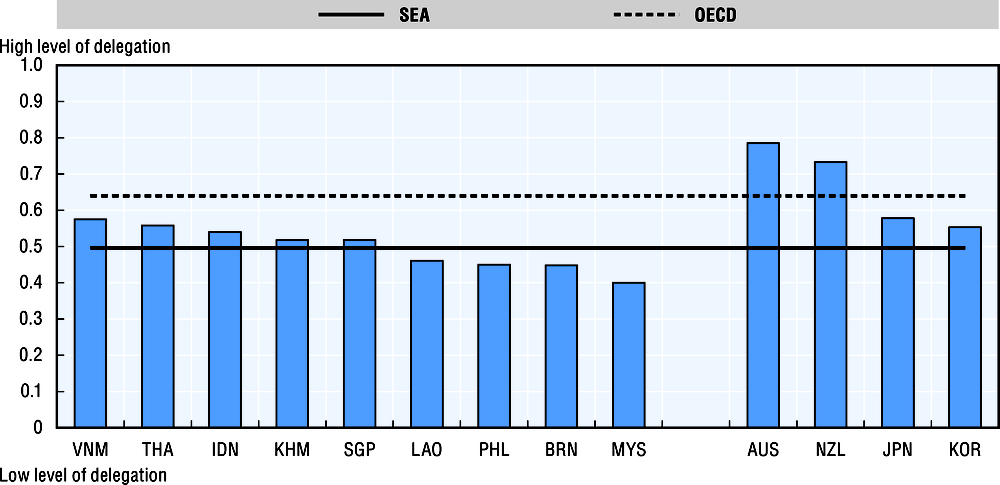Human resources management (HRM) decisions may be taken by central HRM authorities or delegated to line ministries, departments or agencies. Delegating responsibilities – for example on remuneration, recruitment, performance assessment or dismissal – empowers and enables public managers to better adapt working conditions to their organisations’ needs and to individual employees’ merits. Under appropriate framework conditions and minimum standards, delegation could lead to a better alignment of human resources (HR) planning and business strategy. However, without some degree of central oversight, arrangements may instead lead to uneven pay scales, limited opportunities for government-wide strategic HR planning and mobility, and risk nepotism and political interference in staffing decisions. Delegating HRM also requires developing the accompanying HRM competencies at the level where decisions are to be taken.
The composite index presented here summarises the extent of delegation of HRM practices in central government. All nine SEA countries that responded to the survey practice a relatively low degree of HRM delegation, below the OECD average, but close to the level of Korea and Japan from among the OECD countries in the region. Among SEA countries, the Philippines and Viet Nam delegate a high number of issues related to work conditions to the department level and/or unit level. In contrast, Brunei Darussalam and Malaysia, the two SEA countries with the lowest degree of delegation, do not delegate HRM practices to the unit level at all and only rarely to the department level.
Like all OECD countries except Germany and the Slovak Republic, all SEA countries have at least a central HRM unit. In Lao PDR for example, HRM responsibilities are shared between the Ministry of Home Affairs – responsible for positions from administrative staff to Level 3 positions (Deputy Director General) – and the Central Committee of Personnel, responsible for the senior civil service and positions from Level 2 (Director General) to President (General State Secretary).
In Malaysia, which delegates least in SEA, the Public Service Department is responsible for determining the general management of pay systems; working condition flexibility; allocating the budget envelope between payroll and other expenses; performance appraisal systems; and the number and types of posts within organisations. Ministries have some latitude in issues like performance-related pay and recruitment to the civil service. In contrast, Viet Nam delegates the most in SEA. In the Philippines, while the Department of Budget and Management is in charge of all pay-related issues, it is a separate agency from the Ministry of Finance. In Singapore, which falls near the SEA average, the central HR body determines recruitment policy; but ministries, departments or agencies have some scope to apply the general principles and in deciding to hire individuals.
Individual career management is among the functions that tend to be the most delegated to the unit and team levels, namely in Cambodia, Indonesia and Viet Nam. Viet Nam is also the only SEA country that delegates the recruitment of individuals to the civil service and the performance appraisal system to the unit/team level. In OECD countries, individual career management is also among the main functions that are delegated to ministries, unit or team level, although in most OECD countries this remains a central HRM body function.

